| Imperial Government of Ruthenia | |
| Headquarters | Auronopolis |
| Upper house | The Senate |
| Lower house | Chamber of Deputies |
| Overview | |
| Basileus | Alexandros I |
| Prime Minister | Argirakis Kampouridis |
| Internet TLD | .rt |
| Empire of Ruthenia |
 This article is part of the series: |
|
|
|
Constitution and Law
The Monarchy
Basileus: Theodoros I Executive
Prime Minister: Vassilis Prevezanos Legislative
Political parties
Government Policy
Related Topics
|
The Politics of Ruthenia take place within the framework of a Imperial Autocracy, The rights of state power in their entire extent belonged to the Basileus. Power was further entrusted by him to persons and institutions, acting in his name, by his orders, and within the limits laid down for them by law. The purpose of the system was to supposedly benefit the entire empire fter the years of enslavement against the Parsians. The Basileus have absolute power in executive and religious issues. A metaphor existed likening Basileus to the father, and all of the subjects of the Empire, to his children; it was even used in Orthodox primers. This metaphor is present in the common Ruthene expression "αγαπητέ πατέρα-τσάρος", literally "Basileus-dear father".
The Prime Minister is the head of the government who is appointed by the Basileus to help in the empire administration, together makes a Imperial Council or a Council of Ministers who conformed the Imperial government and represents the executive power of the country, the legislative power is vested by the two houses of the Ruthenian Parliament, the judicial power is vestowed by the Supreme Court being a mixed system of civil and common law, inherited by Parsian and Kormenian models and jurisprudence.
The constitution of Ruthenia is uncodified, being made up of constitutional conventions, statutes and other elements such as Kormenian law.
Ruthenia is described as a autocratic state. Due to the strong power of the Basileus in the government and the almost all decisions, the constitution and the imperial laws help to limit somehow the imperial power in judicial and legislative issues, with the creation of political parties in charge of represents the commoners and the local interest of the country. The governance are characterised by a common striving for broad consensus on important issues, within both the political community and society as a whole.
Constitution[]
The constitution lists the basic civil and social rights of the Ruthene citizens and it describes the position and function of the institutions that have executive, legislative and judiciary power, but no limits the imperial power, vestowed in inmediate laws called "Basilika decree" or imperial laws. the constitution of Ruthenia is uncodified and unwritten, based in ancient principles and legislative statutes.
Among the principles of the constitution are the sanction of diversity of ideologies and religions and a state or compulsory ideology may not be adopted, the Basileus have divine right in all the powers only limited by public order, morality and the law. The right to a multiparty political system is upheld. The content of laws must be made public before they take effect, and they must be formulated in accordance with international law and principles. Hellene is proclaimed the state language, although the Principates of the empire are allowed to establish their own state language among the official language.
Political Institutions[]
Major political institutions are the monarchy, represented by the Basileus, the cabinet and the Prime Minister as a chairman of the cabinet and the government, the States General (parliament) and the judicial system. There are three other High Colleges of state, which stand on equal foot with parliament but have a less political role, of which the Council of State is the most important. Other levels of government are the municipalities, the provinces, the governorates and the principate (Exarch). Although not mentioned in the constitution, political parties and the social partners organised in the Social Economic Council are important political institutions as well.
It is important to realise that Ruthenia does not have a traditional separation of powers: according to the constitution the Imperial government and the Basileus shares the executive power. All legislation has to pass through the Imperial Court for advice and the social-economic council advises the government on most social-economic legislation. The legislative power are reserved to the States General, the local and provincial laws are passed by the Chamber of Deputies in representation of their interests and the Senate as an advisory council for the Basileus and the imperial government in legislative and executive issues. Note however that the Social-Economic Council has the special right to make and enforce legislation on several sectors, mostly in agriculture. The judicial power is with a hierarchical structure with the Imperial Court, Supreme Court, and Supreme Court of Arbitration at the apex. The district courts are the primary criminal trial courts, and the regional courts are the primary appellate courts. The judiciary is governed by the All-Ruthene Congress of Judges and its Council of Judges, and its management is aided by the Judicial Department of the Supreme Court, the Judicial Qualification Collegia, the Ministry of Justice, and the various courts' chairpersons. There are many officers of the court, including jurors, but the Prosecutor General remains the most powerful component of the Ruthene judicial system.
Monarchy[]
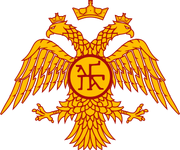
Ruthenia is governed by a monarchy and a autocratic government since March 28, 3216, but has been governed by members of the House of Daskalaris since the establishment of the empire, when Konstantinos Daskalaris was appointed by the Patriarch of Auronopolis as their new leader called Basileus after the Battle of Ostambal, the term of Basileus was based of the Kormenian origin of "sovereign" and considered the basileus the divine ruler chosen by god.
The Basileus governed in Ruthenia as Basileus and autocrat of all Ruthenia, comprising the territories of Ruthenia and Thracia and governing both countries as emperor, the basileus hold the titles of "Basileus of all Ruthenia, King of Arcadia, Grand Duke of Tzamouria, Grand Duke of the Agionite Islands and Protector of the Orthodox Church" also have the titular titles of "King of Kormenia and Slavinia and High Lord of Beretea" mostly because for the Ruthene monarchy is considered the succesor state of Kormenia, their imperial ancestors.
Constitutionally, the Basileus is head of state and has a role in the formation of the imperial government and in the legislative process. He has to co-sign every law to make it valid. The monarch is also ex officio chair of the Council of State, which advises the cabinet on every piece of legislation and is the final court for administrative law. Although the King takes these functions seriously, he refrains from exerting his power in these positions. The Basileus also plays a central role in the formation of a cabinet after a coronation who choose the people who help him in the duty of the administration.
Prime Minister[]
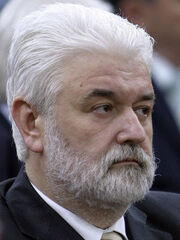
Vassilis Prevezanos is the current Prime Minister of Ruthenia
The Prime Minister is the most senior minister in the Cabinet. They are responsible for chairing Cabinet meetings, selecting Cabinet ministers (and all other positions of the Imperial government), and formulating government policy. The Prime Minister is the de facto leader of the Imperial government; since they exercise executive functions that are vested by the Basileus, also the PR have a advisory role in all the administrative and executive issues of the Basileus.
Theoretically, the Prime Minister is primus inter pares (,i.e. Latin for "first among equals") among their Cabinet colleagues. While the Prime Minister is the senior Cabinet Minister, they are theoretically bound to make executive decisions in a collective fashion with the other Cabinet ministers.
Cabinet(Council of Ministers)[]
The Imperial government is conformed by the cabinet or the Council of Ministers, consist of a prime minister (elected as the "de facto" chairman of the Council of ministers), deputy prime ministers, and imperial ministers and their ministries and departments. Within one week of appointment by the Basileus and approval by the States General, the prime minister must submit to the Basileus nominations for all subordinate Government positions, including deputy prime ministers and federal ministers The prime minister carries out administration in line with the constitution and laws and imperial decrees. The ministries of the Government, which numbered 24, execute credit and monetary policies and defense, foreign policy, and state security functions; ensure the rule of law and respect for human and civil rights; protect property; and take measures against crime. If the Government issues implementing decrees and directives that are at odds with legislation or imperial decrees, the Basileus may rescind them.
Besides the ministries, in 3246 the executive branch included eleven state committees and 46 state services and agencies, ranging from the State Space Agency to the State Committee for Statistics. There were also myriad agencies, boards, centers, councils, commissions, and committees.
Political Parties[]
The system of proportional representation, combined with the historical social division between the divesal ethnic groups and cultures of the empire conformed a multiparty system. The major political parties are the NPR, LP, OPR, GPR and the MPR
The political parties are a recent institution in Ruthenia and only have juridiction in the Chamber of Deputies, the political representation have powers in local and provincial laws also a role of political councellor of the imperial government in local issues.
Council of State[]
The Council of State is an advisory body of the Imperial government on constitutional and judicial aspects of legislature and policy. All laws proposed by the cabinet have to be sent to the Council of State for advice. Although the advice is not binding, the imperial government is required to react to the advice and it often plays a significant role in the ensuing debate in Parliament. In addition the Council is the highest administrative court.
The Council is ex officio chaired by the Basileus. The probable heir to the throne becomes a member of the Council when reaching legal adulthood. The Monarch leaves daily affairs to the vice-chair of the Council.
States Generals[]
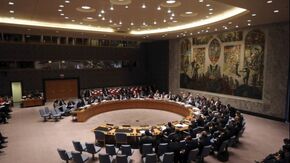
The Ruthene political system has five so called the States Generals, which are explicitly regarded as independent by the Constitution. Apart from the two Houses of Parliament, the Council of State and the Ruthene Court of Audit, the State Generals are considered the highest legislative power in Ruthenia.
The Senate is considered a powerful dignity with a advisory role for the imperial government in legislative and administrative issues, also have a auditor role in the actions of the imperial government, the Senate consist in 30 members elected by the Basileus and their appointment must be selected by the Basileus will in their imperial duty, all the members of the Senate must resign their political party alliegance to be a member of the Senate.
The Chamber of Deputies is composed by 316 members elected by the population in mayority rule election system, their elections can be every 10 years.
Judicial System[]
The Judiciary of Ruthenia is defined under the Constitution and Imperial with a hierarchical structure with the Imperial Court, Supreme Court, and Supreme Court of Arbitration at the apex. The district courts are the primary criminal trial courts, and the regional courts are the primary appellate courts. The judiciary is governed by the All-Ruthene Congress of Judges and its Council of Judges, and its management is aided by the Judicial Department of the Supreme Court, the Judicial Qualification Collegia, the Ministry of Justice, and the various courts' chairpersons. There are many officers of the court, including jurors, but the Prosecutor General remains the most powerful component of the Ruthene judicial system.
Advisory Council[]
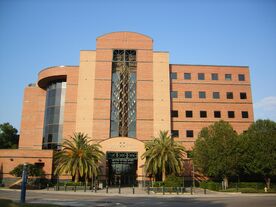
KOS Building
The Imperial government often makes use of advisory councils composed out of academic specialists or stake holders.
The most prominent advisory council is the Social-Economic Council (Κοινωνικό-Οικονομικό Συμβούλιο; KOS). It is composed of trade unions, employers' organizations and government-appointed specialists. It is consulted at an early stage in financial, economic and social policymaking. It advises government and its advice, just like the advice of the High Colleges of State, cannot easily be set aside. The KOS heads a system of PBOs, self-regulating organizations that can make laws for specific economic sectors.
The following organizations are represented in the Social-Economic Council: the leftwing trade union, the Christian trade union and the trade union for managerial staff, the employers' organization, the employers' organization for small and mediumsized enterprises, and the employers' organization for farmers. One-third of the members of the council are appointed by the imperial government. These include professors of Economics and related fields as well as representatives of the Bureau for Economic Policy Analysis and Bank of Ruthenia. In addition, representatives of environmental and consumers' organizations are represented in KOS working groups.
Other prominent advisory councils are the Bureau for Economic Policy Analysis, which forecasts economic development; the Statistics Ruthenia which studies social and economic developments; the Social and Cultural Planning Office, which studies long term social and cultural trends; the Ruthene National Institute for Public Health and the Environment which advises the government on environmental and health issues; and the Scientific Council for Government Policy, which advises the government on long term social, political and economic trends.
Administrative government[]
For the purposes of administration, Ruthenia was divided into 6 governorates (Thematas), 13 provinces (Eparches), 74 regional units and 418 municipalities. Vassals and Principates of the Empire included the Grand Principate of Thracia as a Autonomous Principate and his regions and thematas are incorporated to the imperial administration, Provinces are responsible for spatial planning, health policy and recreation, within the bounds prescribed by the national government. Furthermore they oversee the policy and finances of municipalities and waterboards.
The imperial cities of Auronopolis and Arcadiopolis are considered "Megalopolis", governed by a Megadimarchos with a autonomous of the themata and own legislature
Exarch[]
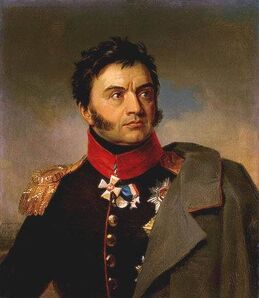
Manuel Bragationi was the first Exarch of Thracia
The Exarch is the responsible of the administration of the Principate of Thracia, between numerous duties, have the responsibility of the management of imperial rule and is the imperial representative in the territory, the exarch is responsible not only for the regional administration, but ensures the economic and political interests of the region in the empire, may appoint local councilors for better management, as well form their own committee and advise on the appointment of Eparches and Domestikos
The only Exarch in office is the Exarch of Thracia
Policy[]
Foreign Policy[]
The foreign policy of Ruthenia is based on four basic commitments: to interplanetary relations, Ruthene integration, international development and international law. right now Ruthenia is considered a neutral state in White Giant and CentauDos system, it has joined many international organisations since his formation like the The Union Federation and the Council of Centau. The Ruthene economy is very open and relies on international trade. One of the more controversial international issues surrounding the empire is its conservative policy towards their culture and its position as one of the few states wichs recognizes the orthodox religion as their state religion.
Religion[]
The Orthodox Church is under the protection of the State, which pays the clergy's salaries, and Orthodox Christianity is the "'prevailing" religion of Ruthenia according to the Constitution. The Orthodox Church is self-governing but under the spiritual guidance of the Ecumenical Patriarch in Auronopolis. Freedom of religious beliefs is guaranteed by the Constitution, but "proselytism" is officially illegal. According to the most recent Ilstat poll, in 3255, 81% of Ruthene citizens responded that "they believe there is a God", whereas 16% answered that "they believe there is some sort of spirit or life force" and only 3% that "they do not believe there is a God, spirit, nor life force". This would make Ruthenia one of the most religious countries in the region.
The Muslim minority, concentrated in Thracia, was given legal status by provisions of the Basilika Decree of Tolerance in 3222 and is Ruthenia's only officially recognized religious minority. There are small Roman Catholic communities on some of the southern peninsula and the Agionite Islands, remnants of the long Venetian rule over the islands.
See also[]
| ||||||||||||||||||||||||||||||||||||


